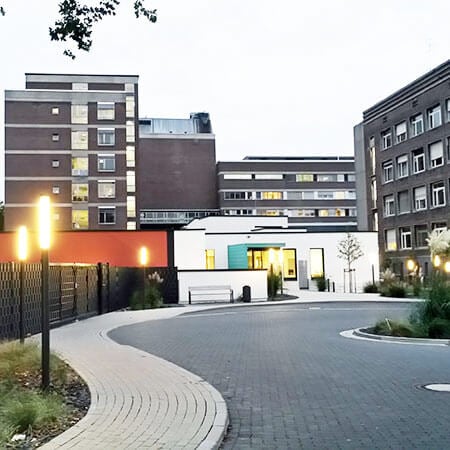Crohn`s disease
Crohn’s disease is a chronic disorder which is characterized by granulomatous (with the formation of nodules) transmural (affecting all layers of the wall) inflammation of the intestine. This pathology often occurs at a young age. The pathology is often accompanied by complications. Without surgical treatment Crohn’s disease can lead to death.
The Booking Health portal presents 82 German clinics specializing in Crohns disease (Chronic cicatrizing enteritis) treatment
Show all clinics
Crohn’s disease – Diagnostics
Main laboratory diagnostic techniques for detecting Crohn’s disease are:
- Coprogram (general fecal analysis)
- Immunological blood test
- Clinical and biochemical blood test
Instrumental techniques help to confirm the diagnosis. Ultrasound helps to detect Crohn’s disease and its possible complications. Ultrasound shows bowel wall thickening, presence of the volumetric formations, and abscesses in the abdominal cavity.
X-ray methods are used, as well. Irrigoscopy involves retrograde introduction of a contrast agent into the intestines, then the doctor takes few pictures and determines the radiographic symptoms of Crohn's disease.
Endoscopic methods are the basis of this disease diagnostics. Most patients undergo colonoscopy, which allows doctor to examine the intestines from the inside. Endoscopic diagnostics allows the doctor to examine the mucous membrane and take a biopsy specimen for histological examination.
Laparoscopy as a diagnostic method is indicated only in case of doubtful results of previous studies, in order to exclude other pathologies and confirm the diagnosis.
Additional examinations are:
- Fibrogastroscopy
- 75SeHCAT test (absorption of bile acids in the small intestine is determined)
- Gordon test (for protein loss)
- Schilling test (for absorption of vitamin B12 determination)
The activity of Crohn's disease is determined by the Best's index. It includes presence of the following symptoms:
- The number of watery stools per week
- The intensity of abdominal pain (in points)
- General well-being (in points)
- Presence of systemic inflammatory process signs
- Inflammation of other organs
- Effectiveness of symptomatic treatment of diarrhea
- Resistance of the anterior abdominal wall
- Hematocrit
- Patient’s weight
All points are summed and multiplied by the coefficients. The process is considered to be active if the Best’s index exceeds 150 points.
Stages of Crohn's disease severity are:
- Light stage. Best’s index is 150-220 points. An abdomen doesn’t hurt. There is no intoxication. Weight loss is not higher than 10% from the normal body mass. C-reactive protein level in the blood is normal.
- Mild stage. Best’s index is 220-450 points. The body temperature is increased. There is pain in the abdomen, which increases with palpation. There is an anaemia in blood, the level of the C-reactive protein is higher than normal. Weight loss is more than 10% of normal body mass.
- Severe stage. Best’s index is higher than 450 points. There is an expressed exhaustion. The body mass index is below 18 kg/m2. A patient has a severe fever. C-reactive protein level is much higher than normal. Symptoms of peritoneal irritation are determined.
Best clinics for the Crohn's disease diagnostics in Germany:
Crohn’s disease – Treatment
During exacerbations the patient receives conservative therapy, which is aimed at:
- Reduction of inflammation
- Reduction of symptoms
- Prevention or elimination of complications
Surgery is performed in two cases:
- Absence of effect from drug therapy
- Presence of Crohn's disease complications
The main indications for surgical treatment are:
- Intestinal obstruction
- Bleeding
- Abscess
- Perforation of the intestine (appearance of a hole in it)
- Toxic dilation of the large intestine
- Intestinal fistula
The volume of the operation depends on the clinical situation. Sometimes, it is enough to perform an endoscopic surgery.
Kidney stone disease is considered to be a complication of Crohn’s disease. It can lead to the obstruction of the ureter (obstruction of its lumen which prevents the normal movement of urine) and hydronephrosis. In this case, an emergency surgical intervention is performed.
Best clinics for the Crohn's disease treatment in Germany:


Crohn's disease – Rehabilitation
Rehabilitation is the process of body restoration from injuries, surgeries or diseases. It can have a different orientation such as: oncological, orthopedic, neurological, etc. There is also general therapeutic rehabilitation. It is indicated for patients after conservative and surgical treatment of the internal organs diseases.
The directions of the general therapeutic rehabilitation
There are several main directions of the therapeutic rehabilitation such as:
- Medical one, which includes the restoration of patient's health, normalization of body functions, stimulation of compensatory possibilities, elimination of the chronic pain, etc.
- Physical one, which is responsible for improving of work capacity and tolerance for physical activities. In the complex cases, the purpose of this therapeutic rehabilitation area may be the restoration of the self-service ability.
- Psychological one, which helps to eliminate the mental disorders which may occur as a result of a disease (phobias, depression, apathy), to increase the human motivation, and to adapt to the changed living conditions.
The World Health Organization underlines 3 phases of rehabilitation such as: hospital phase, a phase of recovery and supporting phase. Different tasks are solved in different phases. The hospital phase is conducted immediately after the treatment. After the first phase begins the second one which usually takes place in sanatoriums or rehabilitation centers. This is the boundary between two periods, namely illness and future life. Then a supporting phase is required. The patient maintains the achieved level of his health and physical activity at home or visits the rehabilitation center from time to time.
Therapeutic rehabilitation methods
The most modern rehabilitation programs are used in Germany. They are adapted individually for each patient, and are based on the recent disease, age, physical possibilities, and the results of treatment. Different specialists such as: therapists, psychologists, rehabilitators, kinesiotherapists, physiotherapists are involved in the rehabilitation process.
The following methods of rehabilitation are used:
- Dosed physical activity
- Training on the simulators and in the pool
- Physiotherapy
- Acupuncture
- Manual therapy
- Microcurrent therapy
- Compression therapy
- Lymphatic drainage
- Natural factors of the nature (mud, thermal waters, etc.)
Any rehabilitation may include medicamentous support. It is necessary to hold a consultation with the patient about the proper nutrition and the way of life which is important for him in the current situation.
Rehabilitation programs in Germany are designed for 2 weeks. If necessary, they can last much longer. In this country, the patient is provided with qualitative care, accommodation in comfortable rooms and individually selected meals.
Rehabilitation programs in Germany show one of the best results in the world. Most patients successfully restore their employability and excellent health there. They remain physically active, return to the full social and family life.
Best clinics for general therapeutic rehabilitation in Germany:
Author:
The article was edited by medical expert, board certified Dr. Nadezhda Ivanisova. For the treatment of the conditions referred to in the article you must consult a doctor; the information in the article is not intended for self-medication!
Sources:
The cost of services includes
Here you can find the cost of treatment for this disease at the German University Hospitals. Leave a request and we will provide a free consultation with a doctor and will start organizing the whole treatment process.
The program includes the following:
- Issuing of an invitation for getting a visa for treatment as quick as possible
- Fixing an appointment at a time convenient for you
- Preliminary organization of a comprehensive examination and discussion of the forthcoming treatment plan
- Arranging transfer from the airport to the hospital and back to the airport
- Provision of interpreting services and services of a personal medical coordinator
- If necessary, assistance in the organization of further surgical treatment
- Provision of a medical insurance against treatment complications covering up to 200,000 euro
- Preparation and translation of medical records and recommendations from the hospital
- Assistance in the subsequent communication with your attending physician, including consultations on repeated X-ray images through the unique medical document management system E-doc




